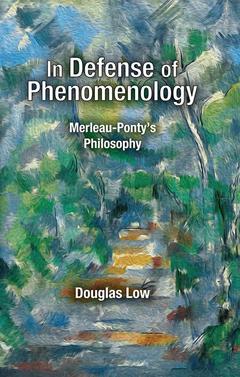In Defense of Phenomenology Merleau-Pontys Philosophy
Auteur : Low Douglas

French phenomenological philosopher Maurice Merleau-Ponty argued for the primary role perception plays in understanding the world as well as engaging with it. As a contributor to phenomenology, Merleau-Ponty faced his fair share of criticisms. In this new book, Douglas Low comes to the defence of both Merleau-Ponty and phenomenology.
In Defence of Phenomenology uses Merleau-Ponty's philosophy to counter the criticisms raised in Vincent Descombes's Modern French Philosophy point by point, arguing that it often misunderstood or misrepresented Merleau-Ponty's philosophy. Low clarifies Merleau-Ponty's claims, then makes the case for them. He also argues against Renaud Barbaras's well-known positions that there is a break in the development of Merleau-Ponty's thought, that Merleau-Ponty abandoned his earlier phenomenology, and that Merleau-Ponty equated being with phenomena. Low also clarifies Merleau-Ponty's complex relationship to Hegel and Marx. Finally, Low addresses the later works of Jean Baudrillard and their move away from phenomenology toward a more postmodernist philosophy, in which language and mass media images dominate culture and even construct our worldview.
In Defence of Phenomenology asserts that Merleau-Ponty more sensibly argued that even though humanity's interpretation of the world is influenced by language and the media, these linguistic and media messages are first suggested by a person's needful, embodied encounters with the world and with others. These messages would make little sense if they did not relate back to this more primordial encounter.
Introduction
Early and Persistent Criticisms of Merleau-
Ponty's Philosophy
Phenomenology and Perceived Being
Phenomenological Time: Presence and Absence
Absolute Subject
General/Anonymous Subject
Phenomenology's Dialectic
Merleau-Ponty and Sartre on the "Interworld"
General Comments Regarding Postmodernism
One Merleau-Ponty, Not Two
Merleau-Ponty's Criticism and Embrace of Hegel and Marx
Epistemology
Interpretation
History
Party and Class
Dialectic and History
Concluding Remarks
Marx, Baudrillard, and Merleau-Ponty on Alienation
Marx
Baudrillard
Merleau-Ponty
Bibliography
Index
Date de parution : 10-2016
13.8x21.6 cm
Thème d’In Defense of Phenomenology :
Mots-clés :
Merleau Ponty’s Philosophy; Douglas Low; Body’s Perceptual Encounter; Bracket Addition; Fundierung Relationship; Merleau Ponty States; Aware Human Body; Merleau Ponty’s Representation; Tacit Cogito; Marx’s Sketch; Merleau Ponty’s Phrasing; Phenomenological Dialectic; Merleau Ponty’s Position; Skeptical Postmodernist; Embodied Subject; Earlier Phenomenology; Chiasm Relationship; Merleau Ponty’s Reference; Merleau Ponty Text; Hyperreal Images; Max Weber’s Methodology; Modern French Philosophy; Merleau Ponty’s View; Social Reproduction; PNP; Coherent Deformation



